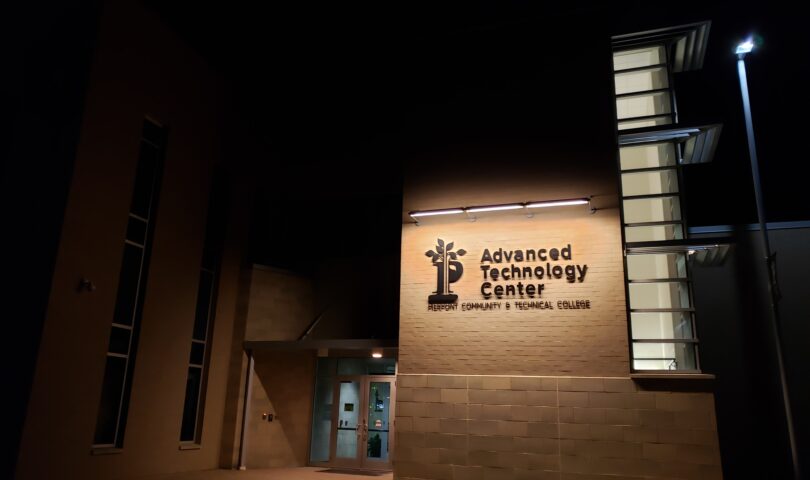FAIRMONT – The Pierpont Community and Technical College held its first meeting since the end of the end of the legislative session on Tuesday evening.
The meeting stretched just over 3 ½ hours before moving to executive session. There was no talk of a merger back into Fairmont State University, or of SB 653 – the bill to make Pierpont Community and Technical College a Division of Fairmont State University that morphed into a bill to have FSU take over Pierpont’s aviation maintenance technology program that died on the last day.
Most of the talk was forward looking. Interim President Anthony Hancock talked about a planned job fair, a 13-county president’s tour to promote the school and the PRIDE Academy to train students with intellectual disabilities.
But the discussion bogged down – for about two hours – on a resolution to approve additional money for transferring Pierpont’s Veterinary Technology Program to the Caperton Center in Bridgeport, and the board’s lack of confidence in Pierpont’s financial future became apparent, despite assurances and deep-in-the-weeds reviews of numbers by college officials.
The board had previously approved $850,000 to move the program from the FU campus to Caperton – one of four programs to be moved under the 2021 separation memorandum of understanding.
The plan was to remodel a portion of existing space at Caperton and add some new construction.
Chief Financial Officer Dale Bradley reminded the board that the bids came out higher than expected and so Pierpont divided the project into five components – the base construction plus four alternate choices: a resource room, faculty office space, a so-called grooming area containing animal bathing facilities needed for accreditation and a monument sign.
Pierpont leadership selected the office space and grooming area projects. Those plus base construction added $690,000 to the price tag; they also put in $50,000 of contingency money not needed for transfer of the culinary program to a different site.
Total cash balances available for capital projects, Bradley said, is about $2.06 million.
Commenting on already escalating costs springing from the pandemic plus what some board members with a business background viewed as a woefully small contingency fund, one member said, “This is about to get carried away.”
Board chair David Hinkle said he’d prefer a 10% contingency fund.
Decision on the resolution was delayed to hear presentations on relocation of the culinary and the early childhood education programs.
The board then voted on the resolution, first approving it in a unanimous voice vote, then, at Hinkle’s direction, a unanimous roll-call vote.
After the public meeting, during executive session, Bradley pointed out to some outside the meeting room that the board did not in fact approve spending the money; it merely approved transferring the money from one account to another.
Between the public meeting and executive session, Hinkle commented on the failure of SB 653 and his view of Pierpont’s prospects. He had previously expressed his doubts about the college’s finances to the House Education Committee.
Hinkle said on Tuesday that he did not support the amended version of the bill, preferring the original. “I was disappointed. I think it was a good thing for north-central West Virginia and both schools. It has left one program that we haven’t been able to find a home for [the aviation program, nicknamed A&P] that that would have solved that issue.”
He said, “Everybody seems to have an answer but nobody seems to come up with a solution to how they want to answer the question.”
He pointed out that the dollar figures discussed during the meeting don’t account for moving the A&P program from the site it shares with FSU’s pilot program at the Robert C. Byrd Aerospace Center in Bridgeport. “We’ve got a $20 million headache sitting around our head with the A&P school.”
Hancock also answered some questions about the college’s future, declining to speak about the bill.
Wednesday marks his 25th year in higher education, he said, in the community and technical college space. “The community and technical colleges in West Virginia are critical to economic independence.”
The state is beautiful but has experienced trials – opioid addiction and population loss among them, he said. “We need to get our act together. How are we going to upscale people who want to be upscaled?”
Two-year and four-year schools each have their niches and missions. “Legislators need to work with presidents of colleges across the state, the chancellor’s office, the council to try to figure out what they want education to be like in West Virginia.”
Asked if the evening’s discussions reflect the idea Pierpont will remain independent, he said, “My mother taught me a long time ago … you can’t control that. So understand what you can control and recognize what that is, and what you can control, operate in that space.
“I can control the day-to-day operation of what happens at Pierpont,” he said. “I cant control what happens down in Charleston or what happens anywhere else.”
Tweet David Beard @dbeardtdp Email dbeard@dominionpost.com




